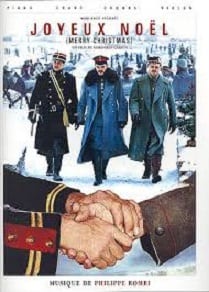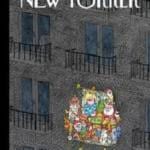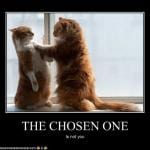There are eight to ten movies that Jeanne and I watch religiously during the Christmas season, from the obvious (“It’s a Wonderful Life,” “White Christmas”) to a few that are not as well-known. We ended our annual Christmas movie-watching binge on Christmas Eve this year with one of the lesser known films, the 2006 French film “Joyeux Noel.” One of my favorites, this film is a fictionalized account of the 1914 Christmas Truce that spontaneously occurred in numerous places along the battlefield trenches throughout France during the first Christmas season of World War I.
The movie is strangely both feel-good and devastatingly sad. The soldiers from both the German and the Allied sides are portrayed as humane and patriotic, willing to share in spontaneous brotherhood and solidarity for twelve hours or so, all the time knowing (as the viewer also knows) that carnage will return within hours and continue for another five hellish years. William Butler Yeats described it well: Things fall apart; the centre cannot hold; / Mere anarchy is loosed upon the world, / The blood-dimmed tide is loosed, and everywhere / The ceremony of innocence is drowned.
I am not the first person during the past months to think of the next two lines from Yeats’ “The Second Coming” when considering current events: The best lack all conviction, while the worst / Are full of passionate intensity. From impeachments to quid pro quos to Brexit to children in cages at the border, these lines capture the essence of the world we live in. During this holiday season, the closing lines of Yeats’ masterpiece are especially haunting: And what rough beast, its hour come round at last / Slouches toward Bethlehem to be born? What is this world that we have created? And what hope is there, as we move to yet another year, to stem the blood-dimmed tide and begin to do something different?
With a few notable exceptions, the public sphere these days is crammed to overflowing with people who embody Yeats’ observation. Those who have boundless passion and energy, grabbing all the headlines and air space regularly display the worst aspects of what humans can be—intolerant, judgmental, pompous, self-centered, ambitious for all the wrong reasons—while evidence of what is best about us seldom rises to our attention. I read in Rebecca Mead’s My Life in Middlemarch not long ago a line from a George Eliot essay that could have been written yesterday about many of our public figures.
In a withering critique of Dr. John Cumming, a well-known nineteenth-century Scottish Evangelical preacher, Eliot comments on his ability “to reconcile small ability with great ambition, superficial knowledge with the prestige of erudition, a middling morality with a high reputation for sanctity.” Our current political landscape is populated with such people; as Eliot writes elsewhere, “one’s ambition is always in the inverse proportion of one’s knowledge.” And this is not forced on us—by all appearances, this is precisely the sort of person that many of us are attracted to.
The obvious solution for this would be to find a way to spark the conviction of the “best” so that better people will seek the highest offices in the land. This is a problem that has challenged philosophers and others since Plato’s Republic—how is one to ensure that the best people are in charge of things (Plato essentially said they should be forced to do so)? My own thinking is that the “best” do not necessarily lack conviction as Yeats suggests; instead, the “best” are those whose conviction leads them to live the sort of life described by George Eliot beautifully in the final sentence of Middlemarch:
The growing good of the world is partly dependent on unhistoric acts; and that things are not so ill with you and me as they might have been, is half owing to the number who lived faithfully a hidden life, and rest in unvisited tombs.
Goodness does not enter the world on grand stages with fanfare and media coverage. Rather, the best people are those who live lives of excellence and virtue with conviction, seeking no reward or notoriety. How is such conviction cultivated?
Many argue that religious faith is the most likely, perhaps the only, source of moral excellence and conviction. There is strong evidence linking faith and moral excellence, but we are all aware of just how much damage and violence has been, and continues to be, done in the name of religious purity and conviction in our nation and world. In his recent book Not in God’s Name, Jonathan Sacks, the former Chief Rabbi of the United Kingdom, reflects on the connection between faith and moral conviction:
Abraham himself sought to be a blessing to others regardless of their faith. That idea, ignored for many of the intervening centuries, remains the simplest definition of Abrahamic faith. It is not our task to conquer or convert the world or enforce uniformity of belief. It is our task to be a blessing to the world. The use of religion for political ends is not righteousness but idolatry . . . To invoke God to justify violence against the innocent is not an act of sanctity but of sacrilege.
It is perhaps time for persons of all faiths to seek common sources of moral conviction, shared simply by being human.
George Eliot consciously intended her novels to be an inspiration for human excellence, but she spent most of her adult life as an agnostic, having left the Anglicanism of her youth behind in her early twenties. She found the wellspring of moral excellence and conviction in obvious, but often overlooked places—our shared humanity and our capacity to empathize with others. Her answer to the perennial question “Why be moral?” is as direct as it is simple:
I am just and honest, not because I expect to live in another world, but because, having felt the pain of injustice and dishonesty towards myself, I have a fellow-feeling with other people, who would suffer the same pain if I were unjust or dishonest towards them. It is a pang to me to witness the suffering of fellow-beings, and I feel their suffering the more acutely because they are mortal—because their lives are so short, I would have them, if possible, filled with happiness and not misery.
This is not a call to debate, legislation, philosophical hair-splitting, or theological distinctions. It is a simple call to action. As the prophet Micah wrote so many centuries ago, “do justice, love mercy, walk humbly.” These are action verbs. We are called to do more than talk.
In keeping with Rabbi Sacks’ call, my New Year’s resolution is to find new ways to be a blessing in the part of the world that is in front of me on a daily basis. Perhaps if enough of us shared that resolution, our collective conviction might introduce some positive change into a world that badly needs it. It’s worth a try.












